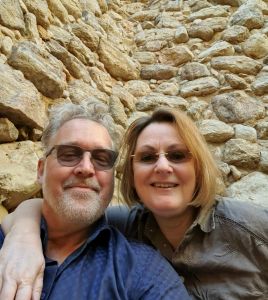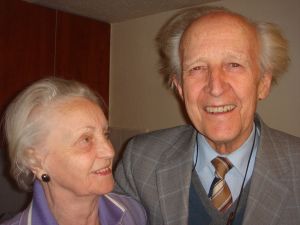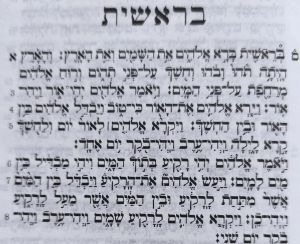Your cart is currently empty!

Yair and Karen Strijker
Welcome to our website! We are Yair and Karen Strijker. We are originally from the Netherlands but we live in Israel. In this column we will tell you how Study House Reshiet came to be.
Studyhouse Reshiet has existed since Pastor R.S. Strijker wrote the Aleph course “Hebrew in Six Days,” this was in the early 1990s. He wanted everyone who reads the Bible to be able to learn Hebrew as well as to do independent Bible word study in order to know what the Bible really says, without the grid of translation. Son Yair picked this up at the time to prepare Jewish children for their bar mitzvah and together they worked out the course for classroom teaching. It was thus obvious that Study House Reshiet would be born and this happened in 1995.

Pastor Roelof Strijker with his wife Tineke
By now we, Yair and Karen Strijker, have been happily teaching from this course for many years and we do much more, such as giving (mostly free) virtual tours of Israel and webinars on the Biblical Feasts such as Passover, Shavuoth and Sukkoth, among others. We also give webinars on other Biblical topics: the Parasha and the Psalms and write our weekly “Shomron News” with news from Israel. Something for everyone. We have two children: Ruth (18) and Sam (17). We have lived in Israel since 2013 in the village of Na’ale, which is beautifully situated in the Ephraim/Benjamin hills, between Tel Aviv and Jerusalem. We run a guesthouse and organize study tours for anyone who wants to enjoy beautiful Israel and have education about the country and the language. Contact us? Click here.
Hebrew is not just any language, but the language that has come to us from the Other Side. The word עִבְּרִית literally means coming from the other side. Hebrew is the language in which God spoke and it came to pass.
Speaking and language, we can read in the book of Genesis, thus preceded creation. According to Jewish lore, the creation of Language is an even greater event than the creations of heaven and earth. The Hebrew Language has its source in God, Who is Himself Language: for He is the Word: “In the beginning was the Word, and the Word was with God, and the Word was God (John 1:1).
preceded creation. According to Jewish lore, the creation of Language is an even greater event than the creations of heaven and earth. The Hebrew Language has its source in God, Who is Himself Language: for He is the Word: “In the beginning was the Word, and the Word was with God, and the Word was God (John 1:1).
Those who immerse themselves in this particularly profound and delicate language will agree that this Language is Divine; that the God of Israel Himself is hidden in this Language, even down to the grammatical rules.
Hebrew is in any case the language in which the Bible came to us. But it is also the language in which Jesus/Jehoshua` revealed Himself. For example, in Acts 26:14 it says that He addresses Paul/Shaoel in Hebrew. That announcement, “I heard a Voice speaking to me in the Hebrew language,” is not there by accident. It is also important that it is there because the New Testament has come down to us in the Greek translation. As a result, there are many people who think that Jehoshua was speaking only Greek and Aramaic at the time. Nothing could be further from the truth, Hebrew is anyway the language that was spoken in the synagogues while Aramaic, the Hebrew sister language with the same letters, was more the everyday language.
Hirsch: Hebrew is the original language. The highly learned and highly esteemed 19th century Rabbi Samson Raphael Hirsch, following in the footsteps of many previous Jewish Bible scholars, has the firm conviction that Hebrew, as we know it today, is not only the sacred, Divine Language: לָשׁוֹן קוֹדֶשׁ láshon qódesh, but also the very oldest human language. According to Hirsch, the “one, universal language” spoken of in Genesis 11:1 must have been a language that came from a single source, consistent, systematic, orderly, and logical in its design. Hebrew fully meets these characteristics.
 When the tower of Babel was built, we read in Genesis 11:7, “Let us confound their language there. In Hebrew it says נִבְלָה שָׁם שְׁפָתַם nibhláh shám shêphátam. The verb nábhal, from which nibhláh is derived, means to fade or wither. So, in fact, the following happened then: the relationship between the tower builders and the language derived from God faded and this resulted in each one developing his own vocabulary. In this blurring of language, confusion of speech, languages arose in which the Creator was no longer transparent, no longer, easily recognizable. Because of this loss of transparency, of transparency and profundity, the words faded and impoverished into empty sound signs, language codes. The letters and the letter coherence between the words lost their typical language meaning and thus became interchangeable in principle. A certain piece of furniture can just as easily be referred to with the word sound ‘chair’ as with ‘table’. The languages themselves thus acquired the character of ‘babble’: the Dutch word babbelen comes from the Hebrew word Bábhel: confusion.
When the tower of Babel was built, we read in Genesis 11:7, “Let us confound their language there. In Hebrew it says נִבְלָה שָׁם שְׁפָתַם nibhláh shám shêphátam. The verb nábhal, from which nibhláh is derived, means to fade or wither. So, in fact, the following happened then: the relationship between the tower builders and the language derived from God faded and this resulted in each one developing his own vocabulary. In this blurring of language, confusion of speech, languages arose in which the Creator was no longer transparent, no longer, easily recognizable. Because of this loss of transparency, of transparency and profundity, the words faded and impoverished into empty sound signs, language codes. The letters and the letter coherence between the words lost their typical language meaning and thus became interchangeable in principle. A certain piece of furniture can just as easily be referred to with the word sound ‘chair’ as with ‘table’. The languages themselves thus acquired the character of ‘babble’: the Dutch word babbelen comes from the Hebrew word Bábhel: confusion.
Hirsch on the squared script. At the Sinai revelation, according to Hirsch, and many with him, the people of Israel received, in addition to the Torah, the original universal divine script, the Hebrew squared script. God himself engraved the Ten Words in this special script in the Two Stone Tables.
As totally different as the God of the Hebrews is, His Language is also totally different. Hebrew has hardly any loan words from other languages. This sacred qódesh language has its very own internal structure and speech, its own logic, and many individual and nuance differences.
Every letter is in its place and not an iota, not a Yod (י), the smallest letter of the Hebrew script, may be scratched out of it: oiwawoi (modern Hebrew expression for: oh woe), those who do!!! From the letter Yod one can still see that Hebrew is a language that comes from the Other Side, from Above. This letter is still hanging in the air, as it were, on an invisible top line.
Language example: the first letter is the Aleph א and this letter reflects God Himself. He is the Aleph, the first letter of the Alephbeth. The Aleph is a silent letter; has no sound of its own and, partly because of this, refers to the silent presence of this unique language Creator. The Aleph is the number 1 and God says of Himself in Deuteronomy 6:4 that He is One. This can be called striking. There are a number of other references from the Aleph to God.*
The word for man, ádám אָדָם, begins with this first letter א. The origin of the word Adam comes from the verb dámáh דָמָה: to resemble. The word ádám also contains the word דָם dam: blood. Adam is being composed of flesh and blood. The first two letters of Adam form the word ‘éd אֵד mist, vapor. Human existence is fleeting, we are like flowers in the field, by evening the strength is almost gone and we become wilted (Psalm 103:15-16). Adam was taken by God from the earth, the adámáh אֲדָמָה. In this word adámáh is hidden again the word damah, which means to resemble and also the Aleph א, that letter referring to God is in it and of course we see the word ádám אָדָם in it as well! So what can we say that all says in the word adámáh: ádám, who was taken from the earth by God is the one who resembles the Aleph, resembles God! How much more proof do we need that Hebrew is really the Language of God? And so Hebrew is full of such wonderful mysteries.
the word Adam comes from the verb dámáh דָמָה: to resemble. The word ádám also contains the word דָם dam: blood. Adam is being composed of flesh and blood. The first two letters of Adam form the word ‘éd אֵד mist, vapor. Human existence is fleeting, we are like flowers in the field, by evening the strength is almost gone and we become wilted (Psalm 103:15-16). Adam was taken by God from the earth, the adámáh אֲדָמָה. In this word adámáh is hidden again the word damah, which means to resemble and also the Aleph א, that letter referring to God is in it and of course we see the word ádám אָדָם in it as well! So what can we say that all says in the word adámáh: ádám, who was taken from the earth by God is the one who resembles the Aleph, resembles God! How much more proof do we need that Hebrew is really the Language of God? And so Hebrew is full of such wonderful mysteries.
Drinking daily from the Biblical Source is as necessary as eating and drinking daily. Any translation can serve that purpose. But just as many people often maintain their health by regularly adding some vitamins or minerals because our diet is sometimes a little too lean or one-sided, so we can supplement our somewhat lean or one-sided Bible translation by taking a few Hebrew supplements daily. One Hebrew word a day or one Hebrew phrase from the Psalms may be enough. Once these Hebrew supplements have entered our hearts through our heads by repetition, they remain fresh and green forever. By ‘sucking them out’ over and over again, they do not lose their power; on the contrary, they become more and more powerful through use, more and more transparent to God, the Word Himself.
minerals because our diet is sometimes a little too lean or one-sided, so we can supplement our somewhat lean or one-sided Bible translation by taking a few Hebrew supplements daily. One Hebrew word a day or one Hebrew phrase from the Psalms may be enough. Once these Hebrew supplements have entered our hearts through our heads by repetition, they remain fresh and green forever. By ‘sucking them out’ over and over again, they do not lose their power; on the contrary, they become more and more powerful through use, more and more transparent to God, the Word Himself.
*In our Aleph course ‘Hebrew in Six Days’ this is covered in more detail.
**translated by DeepL translations free version**
 This Parasha starts by listing the events on Yom Kipur, or the Day of Covering. Kipur comes from the Hebrew verb kipér כִּפֵר to atone, to cover.
This Parasha starts by listing the events on Yom Kipur, or the Day of Covering. Kipur comes from the Hebrew verb kipér כִּפֵר to atone, to cover.
Sins are laid on the head of a goat, which then faces certain death in the desert. Is it a coincidence that this day is described by God just after He gave His instructions about Passover? We may have celebrated Passover a hundred times, He may have been crucified and resurrected a hundred times, but if we don’t actually confess our sins, then it doesn’t make any sense. The Haftarah and also Paul in 1 Corinthians also say this. That is why Yom Kipur is necessary: confess your sins!
The word for sin is the Hebrew word chét חֵטְא, which comes from the Hebrew verb stem chata, חָטָא to sin, to go in a wrong direction. God has done everything for us to save us from our iniquities, now it is up to us to stand pure before Him.
In Amos, God promises that He will restore the people and the land. It is necessary that the land be restored from the iniquities of the people; first from the peoples who lived in the Promised Land before the people of Israel. God speaks about the land having vomited them out, so the land will also vomit out the people of Israel when they commit idolatry and all kinds of sexual sins. This indeed happened and they were taken away, out of the land.
Only at this time may they return, after many of the people have perished, just as the prophecy states (Amos 9:9 and on). The word for vomiting or spitting out is the Hebrew word qi’ קִיא. Doesn’t sound all that tasty…. God is a terrible God, Who also executes His punishments, His people have experienced this and also the believers from the Gentiles do not have to think that they can do but everything because they live under grace anyway. Forget about that, says the apostel Paul in his Corinthian letter.
What important scriptures to read now so in Passover week, what about our hearts and our relationship with Him, after all that we have just remembered and are still remembering in this week. His Word is His fence around our lives that protects us from wrongdoing. If we keep His commandments, then we are safe in His protection, however, if we do not keep them, then even according to Paul’s New Testament Corinthian letter, no grace can stand against that (verse 9, 10).
Translated with www.DeepL.com/Translator (free version)